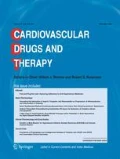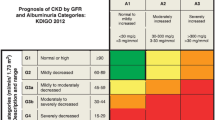Abstract
Background and Aims
Sodium-dependent glucose transporter-2 (SGLT-2) inhibitors, which are anti-diabetic drugs, reportedly decrease the incidence of cardiovascular events in high-risk patients with cardiovascular diseases, and thus chronic heart failure (CHF). SGLT-2 inhibitors also decrease albuminuria in patients with type 2 diabetes mellitus (T2D). Since albuminuria is a biomarker of not only chronic kidney disease but also cardiovascular events, we hypothesized that, among T2D patients with CHF, SGLT-2 inhibitors will decrease the extent of albuminuria and also improve CHF concomitantly.
Methods
DAPPER (UMIN000025102) is a multicenter, randomized, open-labeled, parallel-group, standard treatment-controlled study, which is designed to evaluate whether dapagliflozin, one of the SGLT-2 inhibitors, decreases albuminuria in T2D patients with CHF and exerts cardioprotective effects on the failing heart. The patients are randomized to either of the dapagliflozin (5 or 10 mg, once daily orally) or control group (administration of anti-diabetic drugs administered other than SGLT 2 inhibitors). The estimated number of patients that need to be enrolled is 446 in total (223 in each group). The primary objective is the changes in the urinary albumin-to-creatinine ratio from the baseline after 2-year treatment. The key secondary objectives are (1) the safety of dapagliflozin and (2) the cardiovascular and renal efficacies of dapagliflozin.
Conclusion and Perspectives
DAPPER study investigates whether dapagliflozin decreases albuminuria and exerts beneficial effects on the failing heart in T2D patients. (UMIN000025102).


Similar content being viewed by others
References
Ponikowski P, Voors AA, Anker SD, Bueno H, Cleland JGF, Coats AJS, et al. 2016 ESC Guidelines for the diagnosis and treatment of acute and chronic heart failure: the task force for the diagnosis and treatment of acute and chronic heart failure of the European Society of Cardiology (ESC) developed with the special contribution of the Heart Failure Association (HFA) of the ESC. Eur Heart J. 2016;37:2129–200.
Yancy CW, Jessup M, Bozkurt B, et al. 2013 ACCF/AHA guideline for the management of heart failure: a report of the American College of Cardiology Foundation/American Heart Association Task Force on practice guidelines. Circulation. 2013;128:e240–327.
Gilbert RE, Krum H. Heart failure in diabetes: effects of anti-hyperglycaemic drug therapy. Lancet. 2015;385:2107–17.
Lip GY, Skjøth F, Overvad K, Rasmussen LH, Larsen TB. Blood pressure and prognosis in patients with incident heart failure: the Diet, Cancer and Health (DCH) cohort study. Clin Res Cardiol. 2015;104:1088–96.
Kjekshus J, Apetrei E, Barrios V, Böhm M, Cleland JG, Cornel JH, et al. Rosuvastatin in older patients with systolic heart failure. N Engl J Med. 2007;357:2248–61.
Ronco C, Haapio M, House AA, Anavekar N, Bellomo R. Cardiorenal syndrome. J Am Coll Cardiol. 2008;52:1527–39.
Zinman B, Wanner C, Lachin JM, Fitchett D, Bluhmki E, Hantel S, et al. Empagliflozin, cardiovascular outcomes, and mortality in type 2 diabetes. N Engl J Med. 2015;373:2117–28.
Wanner C, Inzucchi SE, Lachin JM, Fitchett D, von Eynatten M, Mattheus M, et al. Empagliflozin and progression of kidney disease in type 2 diabetes. N Engl J Med. 2016;375:323–34.
Zinman B, Inzucchi SE, Lachin JM, Wanner C, Ferrari R, Fitchett D, et al. Rationale, design, and baseline characteristics of a randomized, placebo-controlled cardiovascular outcome trial of empagliflozin (EMPA-REG OUTCOME™). Cardiovasc Diabetol. 2014;13:102.
Kaku K, Maegawa H, Tanizawa Y, Kiyosue A, Ide Y, Tokudome T, et al. Dapagliflozin as monotherapy or combination therapy in Japanese patients with type 2 diabetes: an open-label study. Diabetes Ther. 2014;5:415–33.
Kohan DE, Fioretto P, Tang W, List JF. Long-term study of patients with type 2 diabetes and moderate renal impairment shows that dapagliflozin reduces weight and blood pressure but does not improve glycemic control. Kidney Int. 2014;85:962–71.
Jackson CE, Solomon SD, Gerstein HC, Zetterstrand S, Olofsson B, Michelson EL, et al. Albuminuria in chronic heart failure: prevalence and prognostic importance. Lancet. 2009;374:543–50.
Lan KKG, DeMets DL, Halperin M. More flexible sequential and non-sequential designs in long-term clinical trials. Commun Stat Theor Methods. 1984;13:2339–53.
Nelson RG, Bennett PH, Beck GJ, Tan M, Knowler WC, Mitch WE, et al. Development and progression of renal disease in Pima Indians with non-insulin-dependent diabetes mellitus. Diabetic Renal Disease Study Group. N Engl J Med. 1996;335:1636–42.
Hovind P, Rossing P, Tarnow L, Smidt UM, Parving HH. Progression of diabetic nephropathy. Kidney Int. 2001;59:702–9.
Matsushita K, Coresh J, Sang Y, Chalmers J, Fox C, Guallar E, et al. Estimated glomerular filtration rate and albuminuria for prediction of cardiovascular outcomes: a collaborative meta-analysis of individual participant data. Lancet Diabetes Endocrinol. 2015;3:514–25.
Valmadrid CT, Klein R, Moss SE, Klein BE. The risk of cardiovascular disease mortality associated with microalbuminuria and gross proteinuria in persons with older-onset diabetes mellitus. Arch Intern Med. 2000;160:1093–100.
Brenner BM, Cooper ME, de Zeeuw D, Keane WF, Mitch WE, Parving HH, et al. Effects of losartan on renal and cardiovascular outcomes in patients with type 2 diabetes and nephropathy. N Engl J Med. 2001;345:861–9.
Parving HH, Lehnert H, Bröchner-Mortensen J, Gomis R, Andersen S, Arner P, et al. The effect of irbesartan on the development of diabetic nephropathy in patients with type 2 diabetes. N Engl J Med. 2001;345:870–8.
Odutayo A, Hsiao AJ, Emdin CA. Prevalence of albuminuria in a general population cohort of patients with established chronic heart failure. J Card Fail. 2016;22:33–7.
Masson S, Latini R, Milani V, Moretti L, Rossi MG, Carbonieri E, et al. Prevalence and prognostic value of elevated urinary albumin excretion in patients with chronic heart failure: data from the GISSI-Heart Failure trial. Circ Heart Fail. 2010;3:65–72.
Cherney DZ, Perkins BA, Soleymanlou N, et al. Renal hemodynamic effect of sodium-glucose cotransporter 2 inhibition in patients with type 1 diabetes mellitus. Circulation. 2014;129:587–97.
Kimura G. Importance of inhibiting sodium-glucose cotransporter and its compelling indication in type 2 diabetes: pathophysiological hypothesis. J Am Soc Hypertens. 2016;10:271–8.
Fitchett D, Zinman B, Wanner C, Lachin JM, Hantel S, Salsali A, et al. Heart failure outcomes with empagliflozin in patients with type 2 diabetes at high cardiovascular risk: results of the EMPA-REG OUTCOME® trial. Eur Heart J. 2016;37:1526–34.
Hillege HL, Nitsch D, Pfeffer MA, Swedberg K, McMurray J, Yusuf S, et al. Renal function as a predictor of outcome in a broad spectrum of patients with heart failure. Circulation. 2006;113:671–8.
Acknowledgments
We acknowledge the great help from Ms. T. Takahashi, R. Umezawa, M. Saida, and M. Yoda for their secretarial assistance.
Funding
This study was financially sponsored by AstraZeneca Plc. and Ono Pharmaceutical Co., LTD.
Author information
Authors and Affiliations
Consortia
Contributions
MK conceived of the study and FY, TH, MK wrote the manuscript. MI, SI, KH, YY, KM, MW, and MA conceived of and coordinated the study. TH and HY performed statistical analyses and provided the biostatistical study design. SY and TA conceived of and supervised the study. MK conceived of and supervised the study and is the grant holder. All authors read and approved the final manuscript.
Corresponding author
Ethics declarations
Conflict of Interest
FY and MK report grants and personal fees from AstraZeneca Plc. and Ono Pharmaceutical Co., LTD, during the conduct of the study.
FY also receive grants from the Japanese government (KAKENHI-PROJECT-17K09002), personal fees from Otsuka, personal fees from Chugai, personal fees from Kyowa-Hakko-Kirin, personal fees from Pfizer, personal fees from Boehringer Ingelheim, personal fees from Novo Nordisk, personal fees from Daiichi Sankyo, personal fees from Takeda, personal fees from AstraZeneca, personal fees from Sumitomo Dainippon, outside the submitted work.
MK also receive grants from the Japanese government (KAKENHI-PROJECT-15H04826), grants from Japan Heart Foundation, grants from Japan Cardiovascular Research Foundation, grants and personal fees from Asteras, grants and personal fees from Sanofi, personal fees from Daiichi Sankyo, grants and personal fees from Pfizer, grants and personal fees from Ono, personal fees from Bayer, grants from Novartis, personal fees from Bheringer, grants and personal fees from Tanabe-mitsubishi, personal fees from Kowa, personal fees from Dainihon-sumitomo, personal fees from Sawai, personal fees from MSD, grants and personal fees from Otsuka, grants from Nihon Kohden, personal fees from Shionogi, grants and personal fees from Astrazeneca, grants and personal fees from Takeda, from Taisho-toyama, outside the submitted work.
MI has nothing to disclose.
TH has nothing to disclose.
TA has nothing to disclose.
SY has nothing to disclose.
SI has nothing to disclose.
HY has nothing to disclose.
KH has nothing to disclose.
YY has nothing to disclose.
KM reports grants from Mitsubishi Tanabe Pharma Corporation, grants and personal fees from Abbott Japan, outside the submitted work.
MW has nothing to disclose.
MA reports grants from Acterion Pharmaceutical Japan, grants from Boehringer Ingelheim Japan, Inc., personal fees from Otsuka Pharmaceutical Co., Ltd., personal fees from Sanofi K.K., personal fees from Bayer Yakuhin, Ltd., personal fees from MSD K.K., personal fees from Takeda Pharmaceutical Company Limited., personal fees from Pfizer Japan Inc., outside the submitted work.
Ethics Approval and Consent to Participate
The final protocol was approved by the National Cerebral and Cardiovascular Center Ethics Committee (approval ID M28-059) and each Institutional Review Board of all participating centers and patient enrollment began in April 2017. This study complies with the 1964 Helsinki Declaration and its later amendments or comparable ethical standards. Written informed consent will be obtained from all patients before recruitment. Personal information about potential and enrolled participants will remain confidential and data will be never identified using participant’s number. This trial has been registered in the UMIN Clinical Trials Registry as UMIN000025102 (http://www.umin.ac.jp/ctr/index-j.htm).
Rights and permissions
About this article
Cite this article
Yoshihara, F., Imazu, M., Hamasaki, T. et al. An Exploratory Study of Dapagliflozin for the Attenuation of Albuminuria in Patients with Heart Failure and Type 2 Diabetes Mellitus (DAPPER). Cardiovasc Drugs Ther 32, 183–190 (2018). https://doi.org/10.1007/s10557-018-6782-1
Published:
Issue Date:
DOI: https://doi.org/10.1007/s10557-018-6782-1




